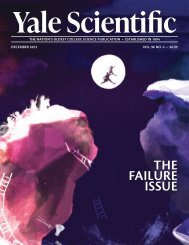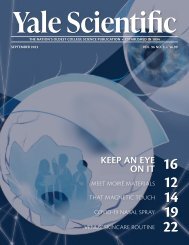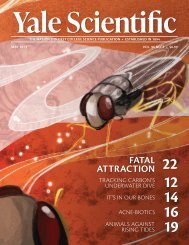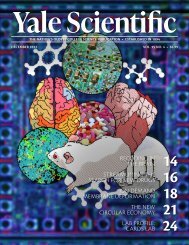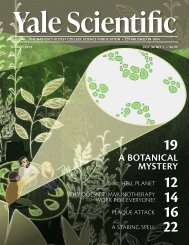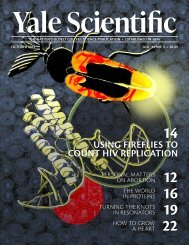YSM Issue 86.1
Create successful ePaper yourself
Turn your PDF publications into a flip-book with our unique Google optimized e-Paper software.
PUBLIC HEALTH
Curtailing Dangerous Habits
BY SAMUEL NEMIROFF
CT
Can public policy curb two dangerous habits at once?
Dr. Sherry McKee and her colleagues from the Roswell
Park Cancer Institute believe so. In a recent study documented
in Drug and Alcohol Dependence, McKee investigated
the results of an international tobacco survey
to study the correlation between smoking bans and
reduced alcohol use. In bars that had recently enacted
or had preexisting smoking bans, researchers found a
significant reduction in the frequency
of alcohol consumption in customers
who were classified as heavy smokers
and drinkers.
McKee’s study built upon prior
findings, which demonstrated that
codependency between smoking
and alcohol use partially stems from
a pharmacological effect. “I believe
that alcohol and tobacco interactions
involve potentiated reinforcement,”
McKee said. “This study demonstrates
that policies designed to reduce tobacco
Research suggests that
smoking bans will reduce
alcohol consumption.
Courtesy of chuckography.
blogspot.com.
use also reduce alcohol use among certain segments
of the population, which has important public health
implications.”
With alcohol abuse as the third leading cause of
preventable death in the U.S., these implications are
tremendously important. In addition, a reduction
of public smoking protects both smokers and nonsmokers
from risks of tobacco-related illnesses, such
as cardiovascular disease and cancer.
Although these health threats are
well documented, during the study
period (2005-2008) only 59.9 percent
of American bars were reported to
be smoke-free, while closer to 100
percent of bars in the U.K., Australia,
and Canada were smoke-free. Continuing
this line of work, McKee is
now studying the effects of tobacco
taxes on alcohol consumption and
alcohol abuse disorders.
MECHANICAL ENGINEERING
Professor Smooke Awarded Zeldovich Medal
Mitchell Smooke, Professor of Mechanical Engineering
and Materials Science and Applied Physics
at Yale University, was awarded this year’s Zeldovich
Gold Medal by the Combustion Institute for his work
in combustion theory.
The Combustion Institute awards
three Gold Medals every two years.
One of them, the Zeldovich medal,
is named in honor of Russian scientist
Yakov B. Zeldovich, the father
of combustion theory. This honor
was recently awarded to Smooke in
Warsaw, Poland .
“I was thrilled about it,” said
Smooke, who has been a key contributor
to developing numerical and
computation procedures. His work
has helped to solve problems relating
to chemically reacting flows, most
notably flame structures.
When asked what made him unique
out of the other candidates across the
world, Smooke replied, “I think part
BY SAVINA KIM
Professor Smooke
was awarded the 2012
Zeldovich Modeal for
his contributions to
Combustion Theory.
Courtesy of Professor
Mitchell Smooke.
of it was that we had developed software that could
be distributed, and we put this general area on the
map when there were not a lot of people doing [computational
combustion] many years ago.” Indeed, the
number of researchers in this field has
expanded exponentially within the last
few years, and Smooke’s work has been
critical to expanding this discipline.
Currently, Smooke and his colleagues
have been busy developing solutions to
problems that involve surrogate fuels,
mixtures of chemical components that
mimic the behavior of transportation
fuels. Funded by NASA, Smooke
and his colleague Marshall Long are
performing one of the five modeling
projects at the International Space
Station, known as the ACME project.
Smooke continues to contribute
towards solving problems of computational
combustion and improving
our knowledge of molecular diffusion
and chemical kinetics today.
www.yalescientific.org January 2013 | Yale Scientific Magazine 7




